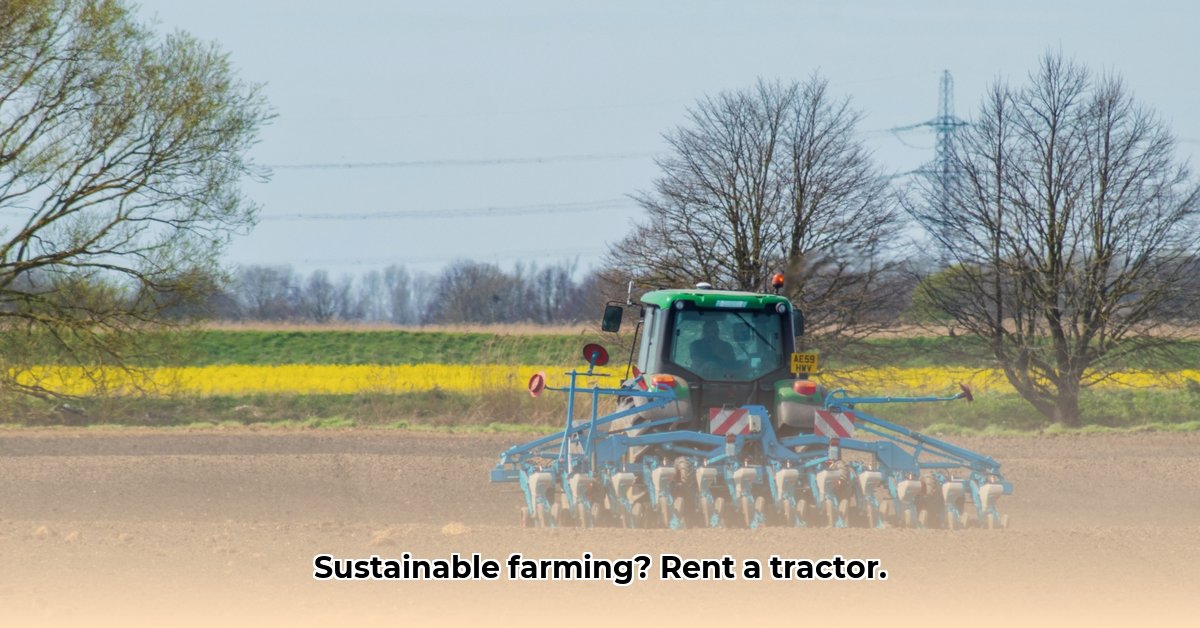
Sustainable farming faces numerous challenges, and access to reliable equipment plays a crucial role in overcoming them. This guide provides actionable steps to secure tractor hire, build disaster resilience, and optimize your farming operations for long-term success. We'll cover everything from finding reliable rental services to negotiating favorable contracts and implementing preventative maintenance. For enhanced precision, consider using GPS guidance systems.
Finding the Perfect Tractor Rental: A Step-by-Step Guide
Securing the right tractor for your needs is the foundation of efficient and sustainable farming. Follow these five steps to ensure a smooth and successful rental process:
Start Your Search: Begin with online searches, focusing on local providers. Network with local agricultural cooperatives, farmers' markets, and other farmers for recommendations. A strong local network can uncover hidden gems.
Check the Reputation: Thoroughly investigate potential rental companies. Read online reviews, request references, and ideally, visit the rental location to assess their operations. Word-of-mouth is invaluable in this process.
Scrutinize the Tractor's Condition: A well-maintained tractor is essential. Inquire about the tractor's maintenance history, including service records and repair schedules. Look for evidence of regular maintenance, such as clean equipment and well-oiled components.
Understand the Rental Agreement: Carefully read the rental agreement before signing. Pay close attention to the rental period, costs (including potential extra charges for late returns or damages), and insurance coverage. Clarify any ambiguities with the provider beforehand.
Secure Adequate Insurance: Comprehensive insurance is crucial. Ensure your policy covers potential damage or injuries relating to the rented tractor. This protects both you and the rental provider.
Weathering the Storm: Building Disaster Resilience with Smart Tractor Rental
Unforeseen weather events significantly impact farming. Proactive planning with tractor hire strengthens your resilience:
Know Your Risks: Identify potential weather-related threats in your region. Are you susceptible to floods, droughts, or extreme temperatures? Understanding your specific risks is paramount.
Create a Contingency Plan: Develop a detailed plan for various scenarios. For instance, have a backup plan for harvesting should a flood threaten your crops, including pre-arranged tractor rental options.
Diversify Your Resources: Utilize multiple rental providers as a safety net. Don't rely on a single source, especially during emergencies when demand is high.
Foster Community Support: Build relationships with other farmers. Shared resources, like collaborative tractor rental agreements or joint insurance, enhance collective resilience. Consider forming a cooperative.
The Financial Landscape: Making Tractor Hire Work for Your Budget
Smart financial management is key in sustainable farming. Tractor hire offers significant cost advantages:
Government Grants and Subsidies: Research local and national programs offering financial aid for equipment rental or sustainable farming practices. These can significantly reduce your financial burden.
Equipment Leasing: Tractor rental avoids high upfront ownership costs. It allows for flexible access to equipment, freeing up capital for other farm needs.
Insurance: Protecting your investment and livelihood requires comprehensive insurance covering potential equipment damage and crop losses. This minimizes your financial risk during unexpected events.
Keeping Your Tractor Running Smoothly: A Preventative Maintenance Checklist
Preventative maintenance is crucial and extends the lifespan of any rented equipment:
Regular Inspections: Weekly inspections of fluid levels (oil, coolant, transmission fluid), tire pressure, belts, and hoses help prevent small issues from becoming major problems.
Scheduled Servicing: Follow the manufacturer's recommended service schedule for oil changes, filter replacements, and other essential maintenance. Regular servicing is cost-effective in the long run.
Operator Training: Ensure operators are properly trained on safe and efficient operation to prevent costly damage and accidents. Proper training is an investment in longevity and safety.
Building a Sustainable Future: The Long-Term Vision
Sustainable farming demands a long-term perspective:
Invest in Resilient Infrastructure: Consider upgrading your irrigation system or storage facilities to better cope with fluctuating weather patterns.
Diversify Your Crops: Growing a variety of crops reduces your risk and enhances soil health and biodiversity.
Strengthen Community Networks: Collaboration is crucial for resilience. Shared resources and support systems from your farming community offer significant advantages.
Smart tractor hire is a fundamental part of this long-term strategy, offering access to essential equipment while managing costs and building long-term resilience. By following the steps outlined in this guide, you can effectively navigate the challenges of securing equipment and build a truly thriving, sustainable farm.